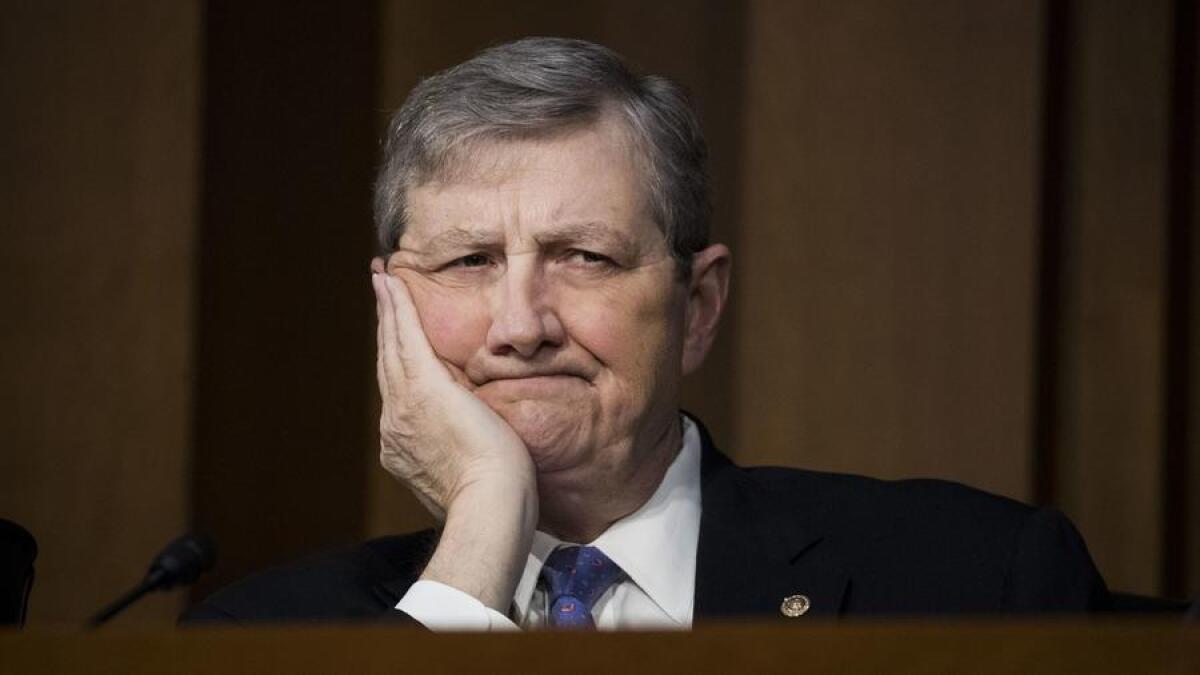Opinion: Democrats slam ‘bad’ Trump judicial nominees, but they don’t like the good ones either

- Share via
Matthew Petersen, whose excruciating interrogation by Sen. John Kennedy (R-La.) went viral last week, has withdrawn as President Trump’s nominee for a federal district judgeship in the District of Columbia.
And, as if Petersen wasn’t embarrassed enough by his inability to define some basic legal terms in response to Kennedy’s questions, the failed nominee — a federal election commissioner — is the subject of a headline in the Onion: “Trump-Appointed Judicial Nominee Displays Legal Expertise By Withdrawing Nomination.”
Petersen, a favorite of White House counsel Don McGahn, is the third Trump judicial nominee to fall by the wayside. The administration also has withdrawn the district court nominations of Brett Talley, who has never tried a case, and Jeff Mateer, who once said the existence of a transgender child was evidence of “Satan’s plan.” (An American Bar Assn. panel rated Talley “not qualified,” while Petersen received a unanimous rating of “qualified” and Mateer received a “qualified” rating from a substantial majority of ABA assessors.)
Senate Democrats, who have accused the Trump administration of rushing judicial nominees through the confirmation process, are claiming vindication. Sen. Dianne Feinstein of California the ranking Democrat on the Judiciary Committee, said: “This is a clear signal that the White House isn’t properly vetting nominees but instead counting on Senate Republicans to jam them through with minimal review.”
Fair enough. Democrats are right to oppose marginally qualified or poorly prepared Trump judicial nominees, or those who owe their nominations to cronyism rather than credentials. (And Republicans should join them, which is why Kennedy’s attitude is so edifying.)
But here’s the thing: Democrats also oppose some Trump nominees whose professional and scholarly credentials are exquisitely in order.
Leave aside the Democrats’ almost universal opposition to Supreme Court nominee Neil Gorsuch: That’s a special case because of the Republican-controlled Senate’s outrageous refusal to act on President Obama’s nomination of Merrick Garland for the vacancy that Gorsuch ultimately filled.
But most Democrats, Feinstein included, also voted against two prominent Trump appeals court nominees: Joan Larsen, a Michigan Supreme Court justice nominated to the U.S. 6th Circuit Court of Appeals, and Notre Dame Law School professor Amy Barrett, nominated to the 7th Circuit. (Implying that Barrett’s fervent Catholic faith might interfere with her impartiality on the bench, Feinstein told the nominee that “the dogma lives loudly within you.”)
Larsen received a unanimous “well qualified” rating from the ABA; a majority of the ABA panel that evaluated Barrett rated her “well qualified” while a minority rated her “qualified.”
It’s true that Democrats can oppose some Trump judicial nominees because they lack adequate credentials while voting against others for different reasons — such as that they are deemed to be unable to separate their religious beliefs from their legal duties. Feinstein also has expressed a concern about Trump subcontracting the selection of judges to “conservative outside groups,” an apparent reference to the Federalist Society.
Yet, listening to Democrats, you might get the impression that Trump is flooding the Judiciary Committee with judicial nominees who are incompetents or nut jobs. In fact (thanks largely to advice from those “conservative outside groups” Feinstein deplored), many if not most of Trump’s nominees are competent conservatives of the sort likely to be advanced by any Republican president.
In these polarized times, that, rather than any deficiency in paper credentials or lack of legal knowledge, is what Democrats find objectionable. Republicans reacted in a similarly knee-jerk way, of course, when Obama was trying to place his stamp on the courts (and not just the Supreme Court).
But don’t pretend that most of the votes cast against judicial nominees are about credentials or the lack of them.
Follow the Opinion section on Twitter @latimesopinion and Facebook
More to Read
A cure for the common opinion
Get thought-provoking perspectives with our weekly newsletter.
You may occasionally receive promotional content from the Los Angeles Times.










